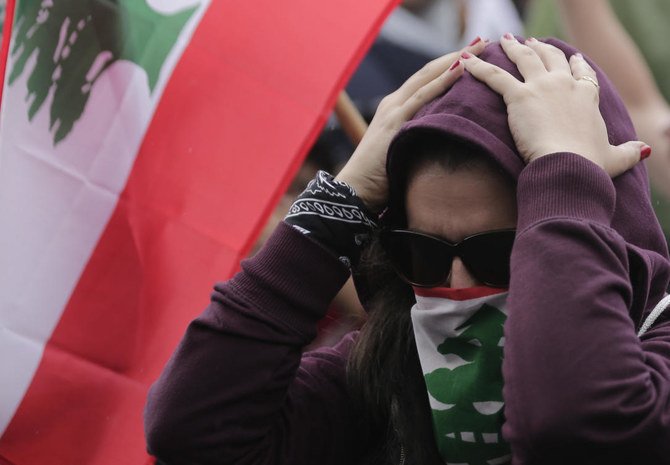
- ARAB NEWS
- 05 Jul 2025

Najia Houssari
BEIRUT: Angry, young Lebanese kept the flame of their peaceful uprising alive after two weeks of widespread protests against deteriorating economic conditions. Their protests coincided with the third anniversary of President Michel Aoun’s election.
Protesters aimed their movement toward obstructing work in public administration, blocking the main roads leading to the capital at night.
Protesters closed the roads with sand hills but removed them at the request of the army. Protesters headed toward public institutions and evicted employees from their offices. A new sit-in took place in front of the Lebanese central bank, with activists chanting against the financial engineering of the bank’s governor, Riad Salameh.
Aoun’s delay in setting a date for parliamentary consultations to appoint a replacement for Prime Minister Saad Hariri, who resigned on Oct. 29, has fueled the anger of the protesters.
In his address on Thursday evening, Aoun pledged to “continue the war on corruption through necessary legislation and push for a productive economy.”
In a message to the young protesters, he vowed “to make every effort to build a modern civil state and get rid of sectarianism.”
Pictures of young protesters burning a huge picture of Aoun in front of a garbage bin while shouting slogans against him were shared on social media.
Supporters of the “Future Movement” joined the streets. One of the supporters in Beirut’s Tarik El Jdideh told Arab News: “We are protesting only making Hariri pay the price when we are calling for the dismissal of every official in power.”
Hariri took to social media to call on his supporters to withdraw from the streets. Hundreds of supporters took to the streets of Beirut on motorcycles overnight on Wednesday in a protest movement. Others — with the majority being in favor of Hariri — blocked roads in areas outside of Beirut, but the Lebanese Army reopened them.
The educational institutions in Beirut remained closed after the resigned Minister of Education Akram Shuhaib retracted his decision to reopen schools and universities.
But areas far from the central protests have almost regained their normal lives, especially in areas where the majority of the people are supporters of Amal, Hezbollah and the Free Patriotic Movement.
The French Embassy delivered a statement from Foreign Minister Jean-Yves Le Drian in which he stressed that “after the resignation of Hariri on Oct. 29, it is necessary for the future of Lebanon to quickly form a government capable of carrying out the country’s needed reforms.”
He also asked all Lebanese political leaders for “the necessity to prevail the spirit of national unity and responsibility in order to ensure stability, security, the country’s public interest and make every effort to avoid provocation, violence and to preserve the right of citizens to protest peacefully.”
The Lebanese Forces Party supported the formation of a technocrat government, as demanded by street protesters. “They will not be able to run the country and confront the international community with a confrontational government. Not forming a technocratic government means taking Lebanon toward the Iranian axis and leading Lebanon into the unknown,” said resigned minister May Chidiac.
Minister of Social Affairs Richard Kouyoumjian said: “We do not oppose renaming Hariri as prime minister because he has wide international confidence as well as the trust of the World Bank and international monetary organizations.”
The opposing Kataeb Party demanded a neutral government and its president, Sami Gemayel, tweeted: “The stalling policy is still going on as if the country is on holiday. Parliamentary consultations must start today so that Lebanon will have a neutral government on Monday at the latest. We will not tolerate this delay.”